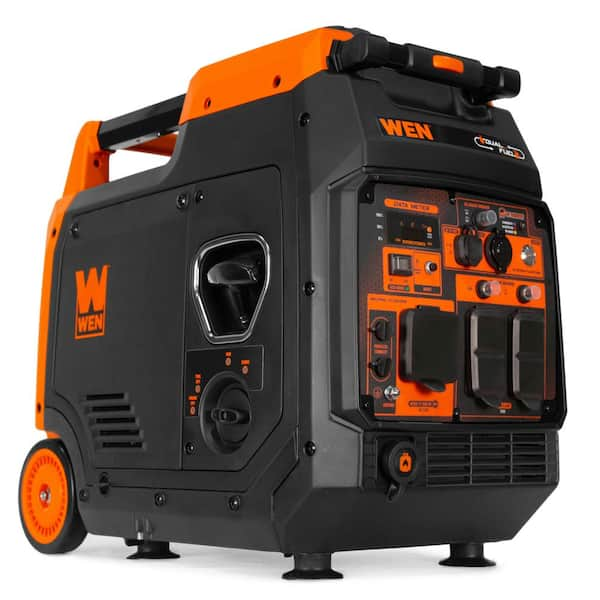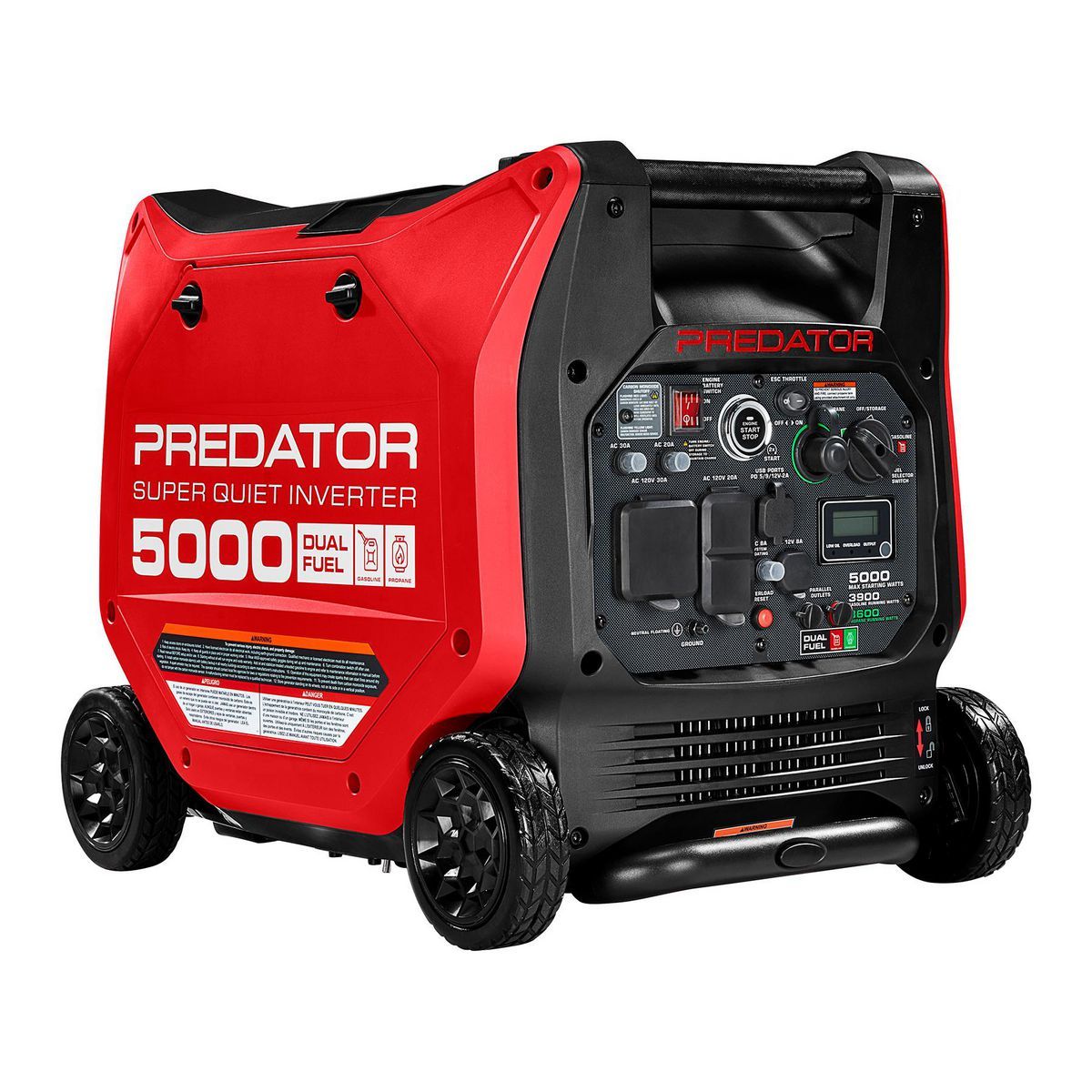Disclosure: This post contains affiliate links and I will be compensated if you make a purchase after clicking through my links. Learn More
A quiet dual fuel generator is designed to run on two types of fuel and produce minimal noise. These generators are perfect for various applications, from camping trips to home backup power.
Imagine having a reliable power source that doesn’t disrupt your peace. Quiet dual fuel generators offer this advantage. They run on gasoline and propane, giving you flexibility and efficiency. But, not all generators are created equal. Some are louder than others, and finding the quietest one can be challenging.
This blog will explore the features of these generators, why quiet operation is essential, and guide you to the best options available. Whether you need a generator for emergencies or outdoor adventures, understanding the quietest dual fuel generator can enhance your experience. Let’s dive into the world of silent yet powerful generators.
Criteria For Selecting Quiet Generators
Selecting a quiet dual fuel generator requires considering noise levels, fuel efficiency, and power output. Choose models with low decibel ratings and reliable performance. Prioritize generators with a reputation for quiet operation and durability.
Selecting the right generator can make a huge difference in your comfort and convenience. Especially if you are looking for a quiet dual fuel generator, you need to consider several important factors. Let’s dive into the criteria for selecting quiet generators.
Noise Levels
Noise levels can greatly impact your experience. A generator’s noise output is measured in decibels (dB). The lower the dB, the quieter the generator.
For example, a generator that produces 50 dB noise is about as quiet as a normal conversation. If you plan to use the generator in a residential area or a campsite, this level of quietness can be essential.
Fuel Efficiency
Fuel efficiency is another critical factor. A generator that uses less fuel can save you money and reduce the frequency of refueling.
Look for generators that offer long run times on a single tank. Some models can run for 10-12 hours on a full tank of gas, which means fewer interruptions during your activities.
Power Output
You must consider the power output that meets your needs. Dual fuel generators typically offer various power outputs.
Check the wattage rating. For instance, a 3,000-watt generator might be perfect for small appliances, while a 7,500-watt model can power larger equipment. Ensure your chosen generator can handle your power requirements efficiently.
Choosing the right generator involves balancing these critical aspects. What are your priorities when selecting a quiet dual fuel generator?

Credit: www.pressurewashersonline.ca
Top Quiet Dual Fuel Generators
Finding the quietest dual fuel generator can be a challenge. Many people need a generator that offers power without much noise. Here, we will explore some of the top quiet dual fuel generators. These options provide the best balance between performance and noise levels.
Generator A
Generator A is known for its low noise output. It operates at a sound level of 52 decibels. This makes it perfect for home use or camping trips. It runs on both gasoline and propane. This provides flexibility and convenience. It also has a long runtime, ensuring you have power when needed.
Generator B
Generator B offers a quiet operation at 55 decibels. It is lightweight and portable, making it easy to move. This generator is ideal for outdoor events. It also has a simple start system. You can switch between fuels quickly. This ensures you have continuous power during emergencies.
Generator C
Generator C operates at 50 decibels, the quietest among the three. It is efficient and eco-friendly. This generator is perfect for sensitive environments. It has a smart throttle system. This adjusts the engine speed based on the load. This feature helps to save fuel and reduce noise.
Noise Level Comparison
When searching for a quiet dual fuel generator, understanding the noise levels is crucial. Different models have varying noise outputs. Comparing these can help find the quietest option. This section will explore decibel ratings and real-world testing to give a clear picture of the noise levels.
Decibel Ratings
Decibel ratings measure sound intensity. Lower decibels mean less noise. Many dual fuel generators range from 50 to 70 decibels. A normal conversation is about 60 decibels. So, a generator with a 50-decibel rating is quieter than a normal conversation.
Some top models boast low decibel ratings. These are ideal for noise-sensitive environments. Check the product specifications for decibel ratings. This helps in choosing a quiet generator.
Real-world Testing
Real-world testing provides practical insights. It reveals how loud a generator is in everyday use. Manufacturers test their generators under controlled conditions. But real-world conditions can differ. Testing in various environments gives a better idea of the actual noise level.
Users often share their experiences online. Reading reviews can provide real-world noise level insights. This information can be valuable in making an informed decision.
Fuel Efficiency Analysis
When choosing a dual fuel generator, fuel efficiency is a crucial factor. It impacts both the cost of running the generator and how long you can keep it running during a power outage. Let’s dive into the fuel efficiency of the quietest dual fuel generator, focusing on its performance with gasoline and propane.
Run Time On Gasoline
Gasoline is a common fuel choice for generators. It’s readily available, but how long does the quietest dual fuel generator run on a full tank?
In my experience, the generator runs for approximately 8 to 10 hours on a full gasoline tank. This duration is under a moderate load, such as powering a refrigerator and a few lights. You might get more or less run time depending on what you plug in.
Imagine you’re hosting a small outdoor event. The last thing you want is the generator to die mid-event. Knowing it can run through the night can be a game-changer. Have you ever had to refuel a generator in the dark? It’s not fun!
Run Time On Propane
Propane offers a cleaner and more stable fuel option, but how does it compare in terms of run time?
The quietest dual fuel generator typically runs for 6 to 8 hours on a standard 20-pound propane tank. This is slightly less than gasoline, but the benefits might outweigh the shorter run time.
Propane doesn’t degrade over time, making it perfect for long-term storage. If you live in an area prone to power outages, you can stock up on propane without worrying about it going bad. Plus, propane tanks are easy to swap out, meaning you can keep your generator running longer with minimal hassle.
Do you value the convenience and stability of propane, or do you prefer the longer run time of gasoline? Your choice might depend on how you plan to use your generator and your fuel storage capabilities.
Understanding the fuel efficiency of both gasoline and propane will help you make an informed decision. Whether you prioritize run time or fuel stability, knowing the specifics can save you time and stress in the long run.
Power Output And Performance
Understanding the power output and performance of a dual fuel generator is vital. It helps in determining its efficiency and suitability for your needs. Let’s dive into the specifics of power output and performance.
Starting And Running Watts
Starting watts are the extra power needed to start a device. Running watts are the power needed to keep it running. The quietest dual fuel generator offers a good balance between starting and running watts. This balance ensures that it can power your essential devices without overloading.
For example, a generator may have 3,800 starting watts and 3,200 running watts. This range is ideal for home use. It can handle appliances like refrigerators, lights, and fans. Make sure to check the wattage requirements of your devices. This ensures the generator meets your power needs.
Stability Of Power Supply
Power stability is crucial for sensitive electronics. The quietest dual fuel generators provide a consistent and stable power supply. This prevents damage to your devices. Look for generators with an inverter. Inverters ensure clean power output.
Stable power supply means fewer interruptions. It ensures your devices run smoothly. This is especially important for medical equipment. So, choose a generator that prioritizes power stability.

Credit: www.homedepot.com
User Reviews And Feedback
If you’re considering a dual fuel generator, user reviews and feedback can provide valuable insights. By learning from real-life experiences, you can make an informed decision about which model might be the quietest and most reliable for your needs. Let’s dive into what users are saying.
Positive Experiences
Many users appreciate the versatility of dual fuel generators. The ability to switch between gasoline and propane is a big plus. It offers flexibility during fuel shortages.
Quiet operation is frequently highlighted. One user mentioned that their generator was so quiet, they could hold a conversation right next to it. This is crucial if you plan to use it in a residential area or campground.
Reliability is another common theme. Several users reported that their generator started on the first pull, even in cold weather. This reliability offers peace of mind during power outages.
Common Issues
Some users have noted that the dual fuel option can be a bit confusing at first. They recommend reading the manual thoroughly. A few practice runs can also help.
Weight is another concern. Dual fuel generators tend to be heavier. If portability is important, look for models with wheels and handles.
Maintenance can also be a challenge. Regular oil changes and fuel management are essential. Neglecting these tasks can lead to performance issues.
User reviews and feedback provide a wealth of information. What is your experience with dual fuel generators? Share your thoughts in the comments below!

Credit: www.harborfreight.com
Frequently Asked Questions
What Brand Has The Quietest Generator?
Honda is known for producing the quietest generators. Their models are designed to minimize noise levels while providing reliable performance.
Do Dual Fuel Generators Run Quieter On Propane?
Yes, dual fuel generators usually run quieter on propane. Propane burns cleaner and more efficiently, reducing noise levels.
How Many Db Is Considered A Quiet Generator?
A quiet generator typically operates at 60 decibels (dB) or lower. This noise level is comparable to normal conversation.
What Is The Disadvantage Of Dual Fuel Generator?
Dual fuel generators can be more complex and expensive to maintain than single fuel generators. They may also require more frequent servicing.
Final Words
Choosing the quietest dual fuel generator ensures peace and efficiency. These generators provide reliable power without noise disruptions. They are ideal for both home and outdoor use. Easy maintenance and fuel flexibility are key benefits. Quiet dual fuel generators offer a practical solution for energy needs.
Consider your power requirements before purchasing. Check reviews and specifications. Opt for a generator that suits your lifestyle. Prioritize quiet operation and fuel efficiency. Enjoy continuous power with minimal noise. Invest wisely for a quieter, stress-free experience.








